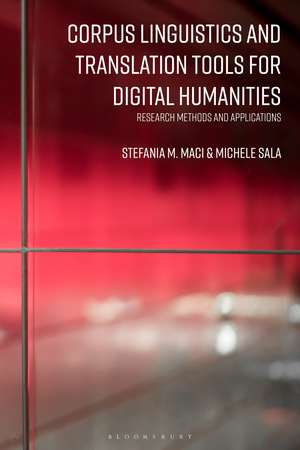Corpus Linguistics and Translation Tools for Digital Humanities: Research Methods and Applications
Editat de Stefania M. Maci, Michele Salaen Limba Engleză Paperback – 21 feb 2024
| Toate formatele și edițiile | Preț | Express |
|---|---|---|
| Paperback (1) | 191.48 lei 6-8 săpt. | |
| Bloomsbury Publishing – 21 feb 2024 | 191.48 lei 6-8 săpt. | |
| Hardback (1) | 598.35 lei 6-8 săpt. | |
| Bloomsbury Publishing – 10 aug 2022 | 598.35 lei 6-8 săpt. |
Preț: 191.48 lei
Preț vechi: 249.45 lei
-23% Nou
Puncte Express: 287
Preț estimativ în valută:
36.64€ • 37.86$ • 30.50£
36.64€ • 37.86$ • 30.50£
Carte tipărită la comandă
Livrare economică 25 martie-08 aprilie
Preluare comenzi: 021 569.72.76
Specificații
ISBN-13: 9781350275263
ISBN-10: 1350275263
Pagini: 248
Ilustrații: 18 bw illus
Dimensiuni: 156 x 234 x 25 mm
Greutate: 0.35 kg
Editura: Bloomsbury Publishing
Colecția Bloomsbury Academic
Locul publicării:London, United Kingdom
ISBN-10: 1350275263
Pagini: 248
Ilustrații: 18 bw illus
Dimensiuni: 156 x 234 x 25 mm
Greutate: 0.35 kg
Editura: Bloomsbury Publishing
Colecția Bloomsbury Academic
Locul publicării:London, United Kingdom
Caracteristici
Shows how to integrate quantitative and qualitative approaches through case studies, sample analysis and practical examples as indicated in books chapters
Notă biografică
Stefania M. Maci is Professor of English Language (University of Bergamo, Italy).Michele Sala is Associate Professor of English Language (University of Bergamo, Italy).
Cuprins
Preface, Mike Scott1. Corpus linguistics and translation tools for digital humanities: An introduction, Michele Sala and Stefania M. MaciPart One. Corpus Linguistics for Digital Humanities: Research Methods and Applications2. Digital Humanities: An adaptive theory approach, Paola Catenaccio3. Comparable corpora in cross-cultural genre studies: Tools for the analysis of CSR reports, Marina Bondi4. Applying a corpus-driven approach in linguistic analyses: The case of lexical bundles and phrase frames, Miguel Fuster Márquez5. Data triangulation using Sketch Engine and WMatrix: Ketogenic diet on Twitter, Stefania M. MaciPart Two. Translation for Digital Humanities: Research Methods and Applications6. The legal translator as a digital humanist: On the use of digital corpora in professional legal translation, Patrizia Anesa7. A comparative study of emotive language in English and Italian migrant narratives, Cinzia Spinzi and Anouska Zummo8. Learning analytics at the service of interpreter training in academic curricula, Francesca Bianchi, Davide Taibi, Philipp Kemkes and Ivana Marenzi9. Exploring the construction and translation of film characters through a parallel corpus: The case of Little Women adaptations, Gianmarco Vignozzi10. Subtitling in the digital era: TV crime drama series in domestic languages, Alessandra Rizzo
Recenzii
A timely, innovative book on the analysis of texts and corpora in digital humanities bringing together a number of thoughtful contributions from corpus methodologies, discourse analysis and translation studies.
This volume addresses a critical gap by bringing together three major research domains: translation studies, digital humanities and corpus linguistics. As such, it will be an important tool for students and researchers in all three areas to better understand the (potential) intersections between them in both theoretical and practical terms.
This volume addresses a critical gap by bringing together three major research domains: translation studies, digital humanities and corpus linguistics. As such, it will be an important tool for students and researchers in all three areas to better understand the (potential) intersections between them in both theoretical and practical terms.
